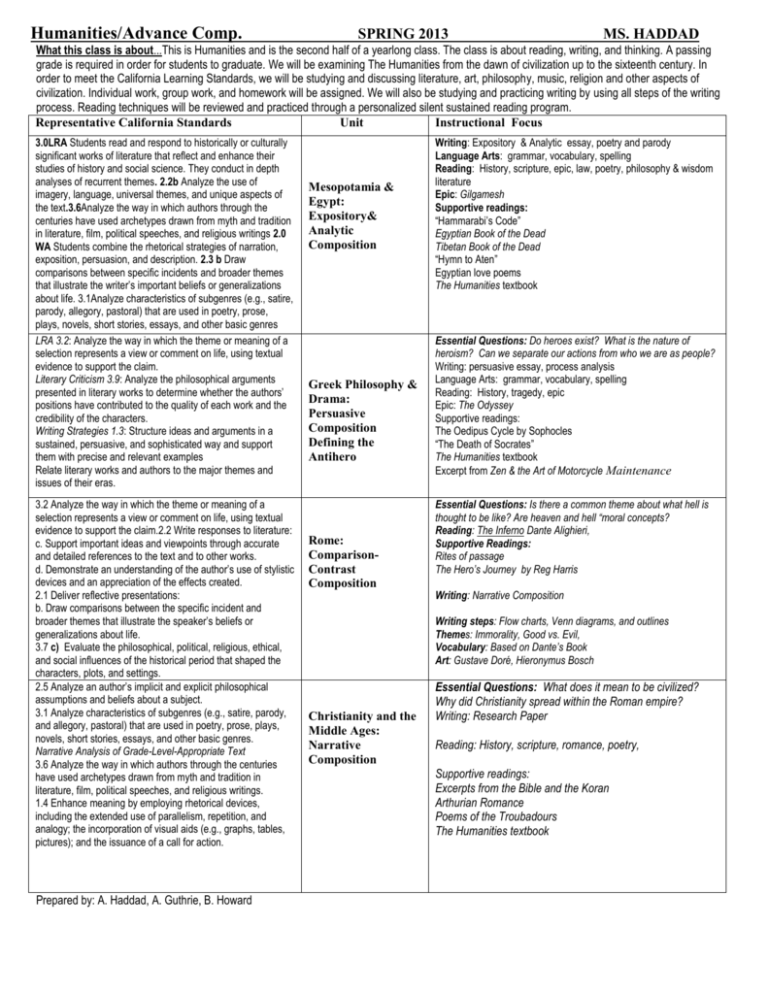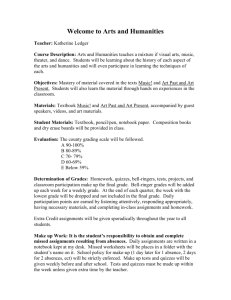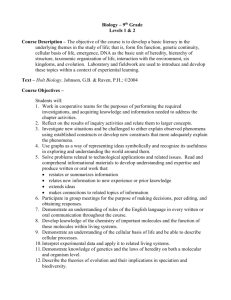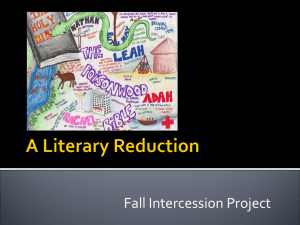class , homework assignments and late work
advertisement

Humanities/Advance Comp. SPRING 2013 MS. HADDAD What this class is about...This is Humanities and is the second half of a yearlong class. The class is about reading, writing, and thinking. A passing grade is required in order for students to graduate. We will be examining The Humanities from the dawn of civilization up to the sixteenth century. In order to meet the California Learning Standards, we will be studying and discussing literature, art, philosophy, music, religion and other aspects of civilization. Individual work, group work, and homework will be assigned. We will also be studying and practicing writing by using all steps of the writing process. Reading techniques will be reviewed and practiced through a personalized silent sustained reading program. Representative California Standards Unit Instructional Focus 3.0LRA Students read and respond to historically or culturally significant works of literature that reflect and enhance their studies of history and social science. They conduct in depth analyses of recurrent themes. 2.2b Analyze the use of imagery, language, universal themes, and unique aspects of the text.3.6Analyze the way in which authors through the centuries have used archetypes drawn from myth and tradition in literature, film, political speeches, and religious writings 2.0 WA Students combine the rhetorical strategies of narration, exposition, persuasion, and description. 2.3 b Draw comparisons between specific incidents and broader themes that illustrate the writer’s important beliefs or generalizations about life. 3.1Analyze characteristics of subgenres (e.g., satire, parody, allegory, pastoral) that are used in poetry, prose, plays, novels, short stories, essays, and other basic genres LRA 3.2: Analyze the way in which the theme or meaning of a selection represents a view or comment on life, using textual evidence to support the claim. Literary Criticism 3.9: Analyze the philosophical arguments presented in literary works to determine whether the authors’ positions have contributed to the quality of each work and the credibility of the characters. Writing Strategies 1.3: Structure ideas and arguments in a sustained, persuasive, and sophisticated way and support them with precise and relevant examples Relate literary works and authors to the major themes and issues of their eras. 3.2 Analyze the way in which the theme or meaning of a selection represents a view or comment on life, using textual evidence to support the claim.2.2 Write responses to literature: c. Support important ideas and viewpoints through accurate and detailed references to the text and to other works. d. Demonstrate an understanding of the author’s use of stylistic devices and an appreciation of the effects created. 2.1 Deliver reflective presentations: b. Draw comparisons between the specific incident and broader themes that illustrate the speaker’s beliefs or generalizations about life. 3.7 c) Evaluate the philosophical, political, religious, ethical, and social influences of the historical period that shaped the characters, plots, and settings. 2.5 Analyze an author’s implicit and explicit philosophical assumptions and beliefs about a subject. 3.1 Analyze characteristics of subgenres (e.g., satire, parody, and allegory, pastoral) that are used in poetry, prose, plays, novels, short stories, essays, and other basic genres. Narrative Analysis of Grade-Level-Appropriate Text 3.6 Analyze the way in which authors through the centuries have used archetypes drawn from myth and tradition in literature, film, political speeches, and religious writings. 1.4 Enhance meaning by employing rhetorical devices, including the extended use of parallelism, repetition, and analogy; the incorporation of visual aids (e.g., graphs, tables, pictures); and the issuance of a call for action. Prepared by: A. Haddad, A. Guthrie, B. Howard Mesopotamia & Egypt: Expository& Analytic Composition Greek Philosophy & Drama: Persuasive Composition Defining the Antihero Rome: ComparisonContrast Composition Writing: Expository & Analytic essay, poetry and parody Language Arts: grammar, vocabulary, spelling Reading: History, scripture, epic, law, poetry, philosophy & wisdom literature Epic: Gilgamesh Supportive readings: “Hammarabi’s Code” Egyptian Book of the Dead Tibetan Book of the Dead “Hymn to Aten” Egyptian love poems The Humanities textbook Essential Questions: Do heroes exist? What is the nature of heroism? Can we separate our actions from who we are as people? Writing: persuasive essay, process analysis Language Arts: grammar, vocabulary, spelling Reading: History, tragedy, epic Epic: The Odyssey Supportive readings: The Oedipus Cycle by Sophocles “The Death of Socrates” The Humanities textbook Excerpt from Zen & the Art of Motorcycle Maintenance Essential Questions: Is there a common theme about what hell is thought to be like? Are heaven and hell “moral concepts? Reading: The Inferno Dante Alighieri, Supportive Readings: Rites of passage The Hero’s Journey by Reg Harris Writing: Narrative Composition Writing steps: Flow charts, Venn diagrams, and outlines Themes: Immorality, Good vs. Evil, Vocabulary: Based on Dante’s Book Art: Gustave Doré, Hieronymus Bosch Christianity and the Middle Ages: Narrative Composition Essential Questions: What does it mean to be civilized? Why did Christianity spread within the Roman empire? Writing: Research Paper Reading: History, scripture, romance, poetry, Supportive readings: Excerpts from the Bible and the Koran Arthurian Romance Poems of the Troubadours The Humanities textbook Representative California Standards Unit 2.5 Analyze an author's implicit and explicit philosophical assumptions and beliefs about a subject. Literary Criticism 3.9 Analyze the philosophical arguments presented in literary works to determine whether the authors' positions have contributed to the quality of each work and the credibility of the characters. (Philosophical approach) 2.3 Write reflective compositions: a. Explore the significance of personal experiences, events, conditions, or concerns by using rhetorical strategies (e.g., narration, description, exposition, persuasion). b. Draw comparisons between specific incidents and broader themes that illustrate the writer's important beliefs or generalizations about life. Instructional Focus Reflective Composition Essential Questions: What is a person's place in nature? How can one achieve harmony? Readings: The Language of Literature(McDougal Littell)& Writer’s Choice (Glencoe) Supportive Readings: The Tao Te Ching Selective Handouts: The Tao of Pooh Writing: Reflective Themes: Wisdom & Spirituality Vocab: Different sources Art :Asian ADDITIONAL READINGS FOR ADVANCE LITERATURE Honors include 5 Units and the following novels: Dante Alighieri: The Divine Comedy Lao Tzu: Tao Te Ching Sophocles: Antigone Beowulf Sir Thomas Malory: Le Morte d'Arthur The Odyssey Dear Students and Parents: My name is Ms. Haddad and I will be your son/daughter English teacher for this school year. The purpose of this letter is to inform you about the course objectives, expectations and procedures. I would like to do everything possible to provide students with the opportunity to have a successful school year. The following information is provided so you may assist in this endeavor. Course Description: The major emphasis to this course during the fall semester for 11th and 12th graders will be on meeting the state standards for reading comprehension and vocabulary, persuasive writing, expository essay and literary analysis writing. Our goal is to become more sophisticated readers, more attentive to voice, style, language and more skilled and inferring meaning and making links between texts and our lives. Students are expected to know their ESLRS. ESLRS An effective Communicator: able to read, write, converse and listen for a variety of purposes An Information Manager: able to locate, access, organize, evaluate and apply information in a complex and technological world. A problem solver, able to apply a variety of thinking, creative and computing skills to produce solutions for practical and theoretical problems A productive member of society: able to demonstrate healthy, responsible behavior and to work collaboratively and respectfully in a linguistically and culturally diverse community. A lifelong learner: able to set educational and career goals, to develop a realistic strategy to achieve those goals and to apply content knowledge and critical thinking skills to adapt to a rapidly changing environment. Materials Needed: Notebook (preferably spiral with plastic cover 150 pages) Composition book (different than the notebook) Pens ( only work on blue or black ink will be accepted ) Highlighter, pencil, eraser, color pencils, ruler and glue sticks Course Requirements: Good attendance (unexcused absences result in zeros) Responsibility for make-up work (the student is responsible for asking about work missed and for making up any tests in a timely fashion.) A book to read in addition to the ones assigned in class (summary of chapters due every Friday) A passing average on course work A research paper Grading Scale: F DD D+ CC C+ BB B+ AA A+ Below 60% 60-62 63-66 67-69 70-72 73-76 77-79 80-82 83-86 87-89 90-92 93-96 97-100 Method of Determining the Grade for Each Marking Period: 40% Notebook (completed with work done in class and homework) 30% Tests (vocabulary and/or grammar tests, composition book and smaller writing assignments) 30% Daily assignments (this includes SSR on Fridays, reading, note taking, group work Major projects will have separate percentage and rubric (this include but not limited to group work) 2 BATHROOM PASSES WILL BE GIVEN PER SEMESTER,( PLEASE USE THEM WISELY ) IF PASSES ARE NOT USED BY THE END OF THE SEMESTER STUDENT CAN REDEEM FOR EXTRA CREDIT POINTS. (50) Class Procedures: The instructor will greet students at the door. Students will be on time and be prepared to work when they enter the classroom. Students will bring materials with them to class Textbooks (both literature and writing) Notebooks Blue or black ink pen All the materials stipulated on the materials list If homework is missing student will stay after school and receive a call home (PARENT PLEASE SIGN)____________________ Students will respond politely to the instructor and to each other. Students will make every effort to pay attention and stay on task (no sleeping, talking or (girls) applying makeup). Students will complete work on time (late policies will be enforced). (Please note that the above procedures are the expectations of a work place. My goal is to treat each of you in a professional manner, as though I were your supervisor. I consider your education a team effort. Your role and my role are both important to your success.) CLASS , HOMEWORK ASSIGNMENTS AND LATE WORK : 1. All written assignments must be typed using a font size of 12 point and 1" margin. I will emphasize that work written in class, composition books and Notebooks be in NEAT penmanship, in addition to the content and quality of thought presented in your assignments. Penmanship is an essential life skill that you will work on in this course. Assignments not adhering to these rules, including hastily written, illegible work, will be returned ungraded and considered late. Students not able to comply with these stipulations should speak with me immediately. 2- Homework, typically in the form of reading, will be given every other day including weekends and holidays. In addition to reading, students will be required to complete essay questions and gather information for in-class and take home projects. 3. Late assignments will be accepted. Late work is defined as an assignment not handed in on the day it is due or any assignment which is deemed by the instructor as substantially incomplete. The penalty for handing in work late is 50%. The assignments will be graded for accuracy and any errors will be deducted from the (already reduced) total. Example: If a 10 point assignment is late and two of the ten answers are wrong, you will receive 3 out of 10. 4. Students are responsible for making up and handing in all work missed due to absences. Students will be given the amount of time to complete the assignment(s) equal to the number of days absent. Discipline Policy: Be on time Treat everyone with respect (including yourself!) Stay on task (no sleeping, disruptive talking or foul language is allowed) If student is disrespectful he/she will be sent to the Dean’s office and a call home will follow. Follow school rules (all school rules will be observed in my classroom, which means NO PHONES OR IPODS THE'LL BE CONFISCATED ON THE SPOT!! ) Cheating and plagiarism are unacceptable and result in grades of zero on any work so compromised (you are also encouraged to have fellow students proofread your written work before you revise) Four bathroom passes will be given for the entire semester Honor Code: Students are expected to abide by the Honor Code (as stated in the Sylmar High School Handbook). Your dedication to the Honor Code will be verified by signing your name on all assignments and by writing the sentence: “I have neither given nor received help on this test.” Learn this sentence and duplicate it exactly, with correct spellings. PLAGIARISM WILL NOT BE TOLERATED! What is plagiarism? Plagiarism is using other’s ideas and works without clearly acknowledging the source of that information. To avoid plagiarism, you must give credit whenever you use: Another person’s idea, opinion, or theory. Any facts, statistics, graphs, drawings, any pieces of information that are not common knowledge, quotations of another person’s actual spoken or written words; or paraphrase of another person’s spoken or written words. If you have any questions regarding class policies or the course material or any other issues related to your child’s performance in class, please do not hesitate to contact me. I can be reached at school at (818) 833-3700 Sincerely, Mrs. Haddad Please indicate that you have read this syllabus and content letter and understand the above policies. Date: _____________ Student Name: _____________________________________Student Signature: ___________________________________________ Parent Name: _______________________________________Parent Signature: ____________________________________________ Home Phone _________________________Cell Phone:________________________Emergency Phone: ________________________ **Students after the syllabus is sign by your parents please glue the entire course outline in your notebooks









